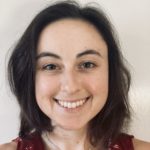By Molly Wylie
Molly Wylie reflects on the lessons she learned as a summer research fellow at the LeadingAge LTSS Center.
 This summer, in the midst of a global pandemic that has strained millions of Americans’ job security, I was fortunate to become a student fellow at the LeadingAge LTSS Center @UMass Boston.
This summer, in the midst of a global pandemic that has strained millions of Americans’ job security, I was fortunate to become a student fellow at the LeadingAge LTSS Center @UMass Boston.
As a third-year PhD student in the Gerontology Department at UMass Boston, much of my day-to-day experience focuses on developing my own skills as an individual academic researcher, including publishing peer-reviewed journal articles and presenting at reputable aging-related conferences.
My previous experience as a care advisor within an Aging Services Access Point—Massachusetts’s version of an Area Agency on Aging—gave me valuable insight into how aging services are delivered on the ground. I knew I wanted summer work with an organization that prioritized the “real world” applications of research. When the LTSS Center’s Washington, DC office welcomed me into its research family for 3 months this summer, it allowed me to build practical, professional, and personal resources that I will carry forward into the next leg of my graduate school career. Here are a few of the lessons I have learned:
Not All Productive Work Needs to Happen In Person.
Typically, LTSS Center fellows are expected to report to the LeadingAge office in Washington, DC, but this summer proved anything but typical. I completed my fellowship responsibilities while spending time with my family in California and Colorado, and participating in regular group Zoom meetings with LeadingAge staff in Boston, DC, and New York.
The work of nonprofit providers of aging services is especially crucial during a pandemic that disproportionately affects older adults. As a result, I had no shortage of projects to attend to.
From preparing a manuscript on formal services utilized by long-distance family caregivers, to researching best practices in Medicaid-funded housing services, to preparing a dataset that tracked how direct care workers were faring during COVID-19, I was never bored. I conducted literature searches, sifted through states’ Medicaid waiver services, and cleaned a large dataset, all on my personal computer. I felt lucky to have so many opportunities to conduct LTSS research, and to do that research from my own home.
Consistent mentorship, even online, builds relationships and maintains accountability.
My fellowship was interactive and social, from weekly Monday meetings with all LeadingAge staff, to personal team-based check-ins, to one-on-one conversations with my research mentors.
As we all know, deadlines don’t disappear during remote work. Weekly meetings kept me accountable for completing tasks outlined at the beginning of my fellowship. Onboarding and training were conducted entirely online, and I met every LeadingAge staff member—from IT managers to human resources directors—through a screen. Katie Sloan, LeadingAge’s president & CEO, invited me to a virtual morning meeting in order to get to know me. We each casually sipped a coffee: she was on Eastern time and I was on Pacific time, 3 hours behind.
Despite the inevitable audio failings, working online with colleagues presented few barriers. I’ve heard the sentiment that while working from home, we have all become busier. Meetings are easier to schedule and easier to attend when they’re conducted from your living room.
I was able to build personal relationships with my mentors Verena Cimarolli, Alisha Sanders, Natasha Bryant, and Robyn Stone without stepping outside my home. Team members seemed to pride themselves on their flat organizational structure; no matter what official title someone held, they maintained humor, humility, and were easily an email or Zoom call away.
Take advantage of networks and partnerships within your organization or institution.
The LeadingAge LTSS Center maintains offices in Washington, DC, and Boston. Marc Cohen, the center’s co-director at UMass Boston, matches gerontology students with relevant LTSS policy projects conducted by the DC team.
Since reaching out to Marc during my first year in UMass Boston’s PhD program, I have since worked with LeadingAge on a variety of projects, from inputting data collected from affordable housing sites to contacting over 1,000 LeadingAge members to encourage participation in the 2019 LeadingAge Member Survey.
This summer’s fellowship solidified my interest in bridging academic research with applied policy work. I want to use my research skills to inform quality improvement efforts among aging service providers, especially in home and community-based settings.
The content to which I was exposed during my fellowship, and the personal and professional connections I made, will likely guide the direction of my dissertation. I can seek advice from my mentors, gain access to relevant datasets, and perhaps even build relationships with nonprofit service agencies.
As a student who is just stepping onto the scene of a career in aging, what else could I ask for?
